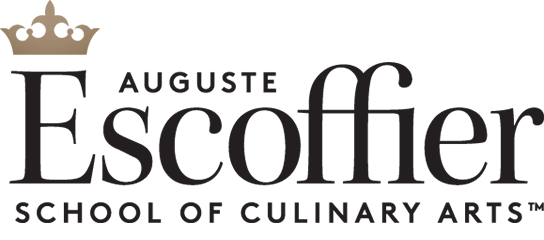“By adopting a more plant-centric diet, you’re going to be forced to be more creative, or you’re going to be forced to investigate ingredients that you never thought you’d cook with. And as a result, I think it’s actually kind of an expansion of your culinary capacities to cook plant-based.”*
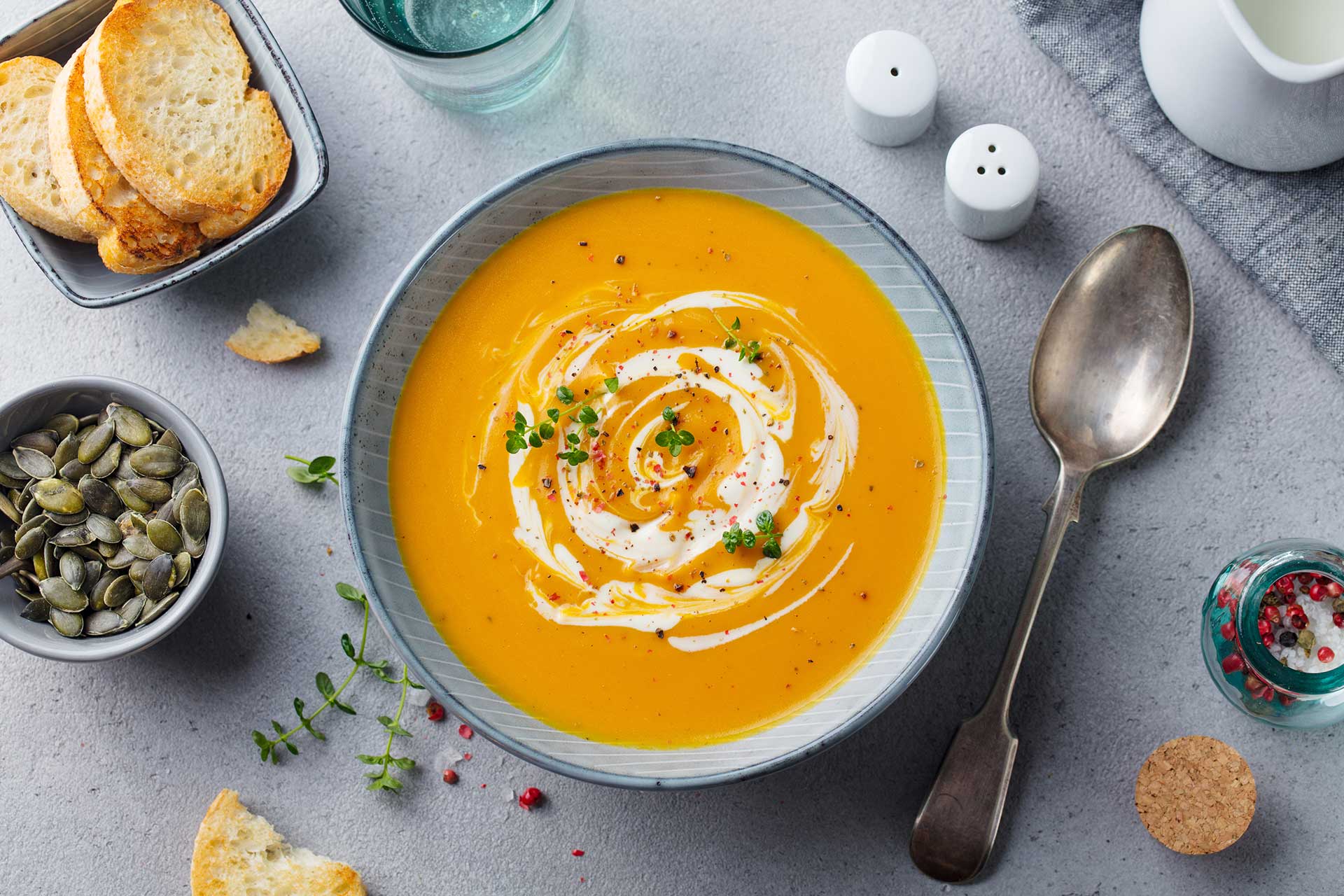
ASSOCIATE DEGREE
Plant-Based Culinary Arts
ONLINE PROGRAM

SHANE WITTER-HICKS, ESCOFFIER CULINARY ARTS GRADUATE, PLANT-BASED ENTHUSIAST & PRIVATE CHEF/EDUCATOR, THE SOULFUL SPREAD
meet escoffier chef-in-residence
Kristen Kish is the host of Top Chef and Escoffier’s new Chef-in-Residence. Chef Kish will help inspire Escoffier students through a special lecture class, exclusive content, and other engagement activities. About Kristen Kish
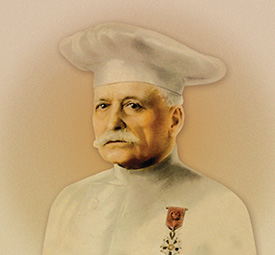
Did you Know?
Auguste Escoffier was known as the King of Chefs and the Chef of Kings!
His contributions to the culinary world include, but are not limited to: creating the menu, designing the five mother sauces, promoting farm-to-table cuisine, and instituting sanitation standards. His influence on cuisine is felt in kitchens across the world nearly a century later!
BEST COLLEGES FOR CULINARY ARTS
#1 Boulder campus (including online programs) and #2 Austin campus as ranked by Niche.com 2025
*Based on comparable student population data for Austin and Boulder as currently reported in Integrated Postsecondary Education Data System (IPEDS).
Stephanie Michalak White, Director of Academic Enrichment*
Your Goals, Your Passion, Your Future
Our Mission
To cultivate passion and lifetime careers in food, hospitality and health by offering affordable, accessible and socially minded education and opportunities to learn.
Accreditations & Associations
We are the only U.S. accredited institution offering 100% online degrees with culinary classes and hands-on industry externships!1

U.S. Department of Education Recognized Agency
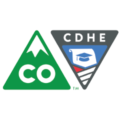
Colorado Department of Higher Education

National Council for State Authorization Reciprocity Agreements

2023-2024 MILITARY FRIENDLY®️ SCHOOL
Our online programs are available through the Boulder campus. Auguste Escoffier School of Culinary Arts in Boulder, Colorado is nationally accredited by the Accrediting Council for Continuing Education and Training (ACCET).
It is also approved and regulated by the Colorado Department of Higher Education (CDHE), Division of Private Occupational Schools. Auguste Escoffier School of Culinary Arts (Boulder, CO) has been approved by CDHE to participate in the National Council for State Authorization Reciprocity Agreements (NC-SARA).
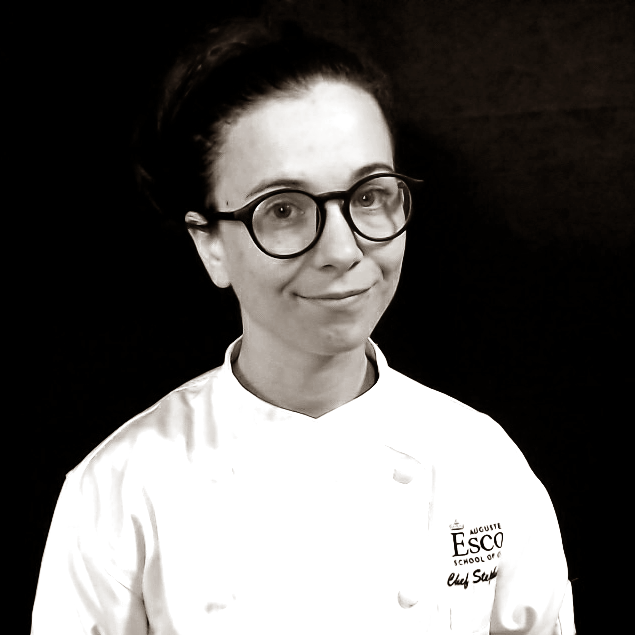
“We’re able to connect with students that may have not thought about sustainability from an environmental perspective. Being a smart business owner means that you’re also being smart about the foods that you’re preparing and buying. Our students are able to make an impact on their future career, their current career, and how sustainability is a big piece of it.”*
STEPHANIE MICHALAK WHITE, DIRECTOR OF EDUCATION
Curriculum
Multiple classes can occur during one 6-week session.
Plant-Based Culinary Foundations I
In this course, students will be introduced to food safety and sanitation practices in order to prevent foodborne illnesses. They will also be presented with information about food allergens, levels of severity, and measures a chef can take to keep guests safe and included. Students will familiarize themselves with not only traditional culinary tools, utensils, and equipment but also those unique to the plant-based kitchen. They will practice knife safety, cutting techniques, standard measurements and conversions, and basic cooking techniques. Classify foods into their food groups to understand basic recipe structures and begin modifying traditional recipes with plant-based substitutions.
Plant-Based Culinary Foundations II
In this course, students will continue their plant-based education with the creation of stocks and soups, which will be leveraged in future plant-based dishes. Students will also prepare a variety of legumes and grains that introduce new techniques and flavors to their culinary palate.
Menu Design
This course explores different types of menus (including both food menus and beverage menus) and their applications. The course covers all aspects of menu planning and design, ranging from visual design to prices analysis to making use of available resources. The menu is both a financial tool and a communication tool, and students learn about its uses as both.
Plant-Based Culinary Foundations III
In the final foundations course, students will apply skills and knowledge gained in prior foundations to the preparation of stews. Students will also prepare a variety of plant-based proteins using the appropriate techniques for each. Finally, students will combine all their fundamental culinary skills and apply them to the theory of meal composition. They will design and prepare balanced dishes focusing on meal composition, flavor profiles, and depth of flavor.
Foundations of Plant-Based Pastry I
In this course, students will be presented with ways to create plant-based frozen desserts as well as techniques to prevent them from freezing solid or becoming gritty in the freezer. They will also prepare fruit based and raw desserts, cookies, bars, and confections using a variety of ingredients such as cream-based sauces, puddings, fillings, nuts, and seeds to name a few. Students will be introduced to techniques for replacing traditional baking ingredients with plant-based alternatives and how to build flavor in their plant-based pastry dishes.
Purchasing and Cost Control
Three out of five foodservice operations fail within five years of opening, often due to money mismanagement. This course gives students the skills to not only keep their restaurant in business but to also turn a profit. This course introduces students to purchasing, receiving, inventory management and menu pricing. In this course, students learn how to minimize costs and maintain a full range of customer services. The course progresses from the fundamentals of culinary math into an overview of storeroom operations, inventory, portion control, as purchased and edible portions, ingredient conversions, and recipe costing.
Foundations of Plant-Based Pastry II
Students will expand upon content learned in Foundations of Plant-Based Pastry I. They will continue their awareness of flavor balance as they use ingredients like fruit purees, for example, to enhance the taste and texture of their plant-based desserts. Students will prepare a variety of plant-based pastries such as cakes, breads, muffins, breakfast foods, truffles, ganache and more! They will also work with yeast allowing them an opportunity to practice folding, rolling, twisting, and cutting dough as they create classic forms that are enriched by seasonings and toppings. Finally, students will modify recipes to accommodate gluten-free diets.
Seasonal Plant-Based Cuisine
This course explores seasonal plant-based cooking using ingredients available during spring, early summer, mid-summer, late summer, fall, and winter. Students will explore ways to find and select seasonally fresh vegetables at supermarkets, farmer’s markets, and the like and how to optimally cook them for the best dining results. Students will also be introduced to the benefits of Farm to Table® cooking and the importance of sustainability practices as they relate to culinary outcomes.
Foodservice Management
This course covers the different types of commercial foodservice operations, and how to manage each using the principles of good service. Students study the hierarchy of management in foodservice, and the skill needed to succeed as a manager: training employees, motivating, them, disciplining them, and creating a safe and positive work environment. The course also explores how to act responsibly and make decisions that benefit the company.
Plant-Based Approaches to Wellness
In Plant-Based Approaches to Wellness, students will examine philosophies of wellness unique to plant-based eating such as, Whole Food Plant-Based, Raw, Ayurveda, and Macro. Students will also look at trending diets and how to prepare dishes within a plant-based culinary framework. Moreover, they will explore various ingredient substitutions to accommodate allergy restrictions.
Cultural Influences I
Students will begin their culinary journey around the world in this Cultural Influences I course. They will be exposed to the traditions, customs, and ingredients unique to specific countries such as Japan, Italy, Greece, India, France, and Vietnam. Students will apply the skills that they have cultivated throughout this program to prepare culturally authentic plant-based dishes.
Entrepreneurship
This course is a culmination course in entrepreneurship. This course covers such topics as business planning, pricing, credit management, government regulation, and legal concerns. Business ethics and the crucial role and importance of management and leadership are also covered.
Cultural Influences II
Students will continue their cultural culinary journey in Cultural Influences II. They will be exposed to the traditions, customs, and ingredients unique to specific countries such as Lebanon, Thailand, Spain, Mexico, Morocco, and the United States. Students will apply the skills that they have cultivated throughout this program to prepare culturally authentic plant-based dishes.
Externship I
This course provides opportunities for real life experiences in an operational restaurant or related business and builds on the skills and techniques covered in previous courses. In the course, students apply the skills they have learned in practical ways to real-world situations. Students gain hands-on experience in the kitchen that mirrors their future work in the industry while developing necessary career skills. Immersion in a work environment also allows students to develop industry contacts and build working relationships.
Students can first complete the Diploma in Plant-Based Culinary Arts program and then add the remaining course requirements to complete the Associate of Occupational Studies in Plant-Based Culinary Arts.
Intro
Completed Diploma in Plant-Based Culinary Arts Program
*When a student completes the Diploma in Plant-Based Culinary Arts online program prior to enrolling into the Associate Degree program.
Courses for Diploma in Plant-Based Culinary Arts consist of:
Plant-Based Culinary Foundations I
Plant-Based Culinary Foundations II
Menu Design
Plant-Based Culinary Foundations III
Foundations of Plant-Based Pastry I
Purchasing and Cost Control
Foundations of Plant-Based Pastry II
Seasonal Plant-Based Cuisine
Foodservice Management
Plant-Based Approaches to Wellness
Cultural Influences I
Entrepreneurship
Cultural Influences II
Externship I
Business and Professional Communications
The Business and Professional Communications course emphasizes the principles and practical application of effective professional communication behaviors within professional, business, and organizational contexts. In addition to identifying the importance of effective communication skills to the hospitality industry, communication styles and effective listening methods are addressed.
World History and Culture from the Culinary Perspective
Throughout history, food has done more than just provide nourishment. From prehistoric times to the present day, food and the pursuit of it has had a transformative role in human history. Food has impacted society organization, industrial development, military conflict, and economic expansion. As epicure and gastronome Jean-Anthelme Brillat-Savarian stated, “Gastronomy govern the whole of the human man.” This course examines the role of food and its contribution and influence over history, culture, religion, economics, and politics.
The Science of Nutrition
This course covers the basic principles of nutrition, emphasizing nutrients, food sources, and their role in growth, development, and overall health. Contemporary and global nutritional issues are also discussed.
Foodservice Math and Accounting
All foodservice managers, regardless of the type of foodservice business with which they are involved, must understand and manage the costs associated with operating their businesses. Foodservice Math & Accounting introduces students to managerial accounting and cost control concepts and explains their applications to specific operations within the hospitality industry. Emphasis is placed on how to administer accounting procedures to minimize costs and maintain a full range of customer services.
Introduction to Psychology in the Workplace
The goals of psychology are to describe, explain, predict, and influence behavior and mental processes. With these goals in mind, students will study the scientific process and learn to explain psychological phenomena. They will learn about how those phenomena fit into major psychological theories, and how to practically apply the ideas of psychology.
Externship II
This course provides additional opportunities for real life experiences in an operational restaurant or related business and builds on the skills and techniques covered in previous courses.
Additional Opportunities For Students

International Study Opportunities in France
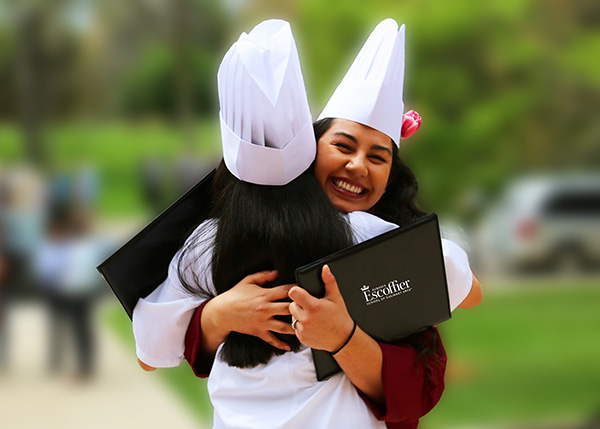
Annual graduation in Boulder, CO
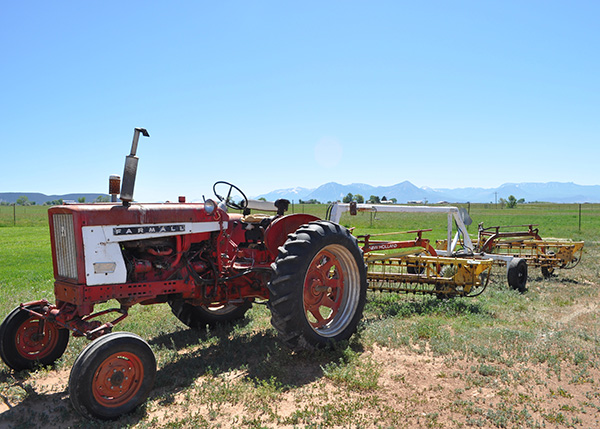
Farm to Table® workshops throughout the year
How Online Culinary School Works
Program Highlights

Professional Instruction

Entrepreneurial & business-focused

Sustainability & Wellness-Focused

100% ONLINE CLASSES WITH hands-on INDUSTRY EXTERNSHIPS

PRACTICAL SKILLS & OPERATIONAL AWARENESS

CAREER PLANNING
AND PREPARATION

EMPHASIS ON FOODSERVICE MANAGEMENT & COST CONTROL

NATIONALLY ACCREDITED

KITCHEN LAB: HANDS-ON ASSIGNMENTS
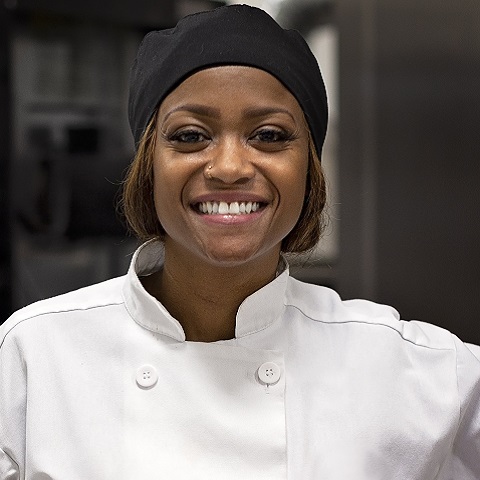
“My purpose is to feed life. Escoffier, definitely with their farm-to-table lifestyle, fit with my ethics about work. So, I encourage anybody: Don’t stop your dreams. If you want to go back to school, go back to school. And you can definitely do that after you retire or separate from the military. Because your life does not stop.”*
TIFFANY MOORE, ONLINE CULINARY ARTS GRADUATE & U.S. Army Veteran
Tuition
TOTAL PROGRAM COST:
$35,145*
The total program cost listed above encompasses tuition, tool kit, uniform, and an optional non-refundable technology fee if you do not already have a computer. As textbooks are delivered electronically, the cost of books used in the program and available online to the students are included in the tuition cost. For more cost details, refer to our catalog. This is the tuition with the Associate Degree taken fully online. When a student is enrolling into the Associate Degree program as a graduate from the Diploma in Plant-Based Culinary Arts online program or Diploma in Plant-Based Cuisine residential program, after qualified transfer credits, the remaining tuition is estimated based on the current rate at the time of transfer. The courses that would qualify for transfer into Restaurant Operations would be: Foodservice Management, Purchasing and Cost Control, and Menu Design.
FINANCIAL AID IS AVAILABLE FOR THOSE WHO
APPLY & QUALIFY.
School Code: 037763
A Typical Week at Escoffier
Approximately 15-23 hours per week is spent on school related activities depending on program, credential and personal pace.
The week runs from Wednesday to Tuesday with weekly due dates for student work.
Each week’s assignments will be broken into categories of learn, discuss and experience.
LEARN
Each week will begin with assigned reading via our online platform. Students will also watch the recorded chef demos for the week here.
DISCUSS
Students participate in discussion boards where the class responds to topics and questions the chef posts in regards to what you’re learning that week. There will also be live lessons held through a video platform each week. Live Sessions are your opportunity to interact with your chef and classmates. Students who attend or watch the archive generally perform better in school.
EXPERIENCE
This is where students turn their kitchen into their classroom lab, and cook! With all the prep work completed, students can now work through assignments by following our production sheet from start to finish, taking photos where instructed to.
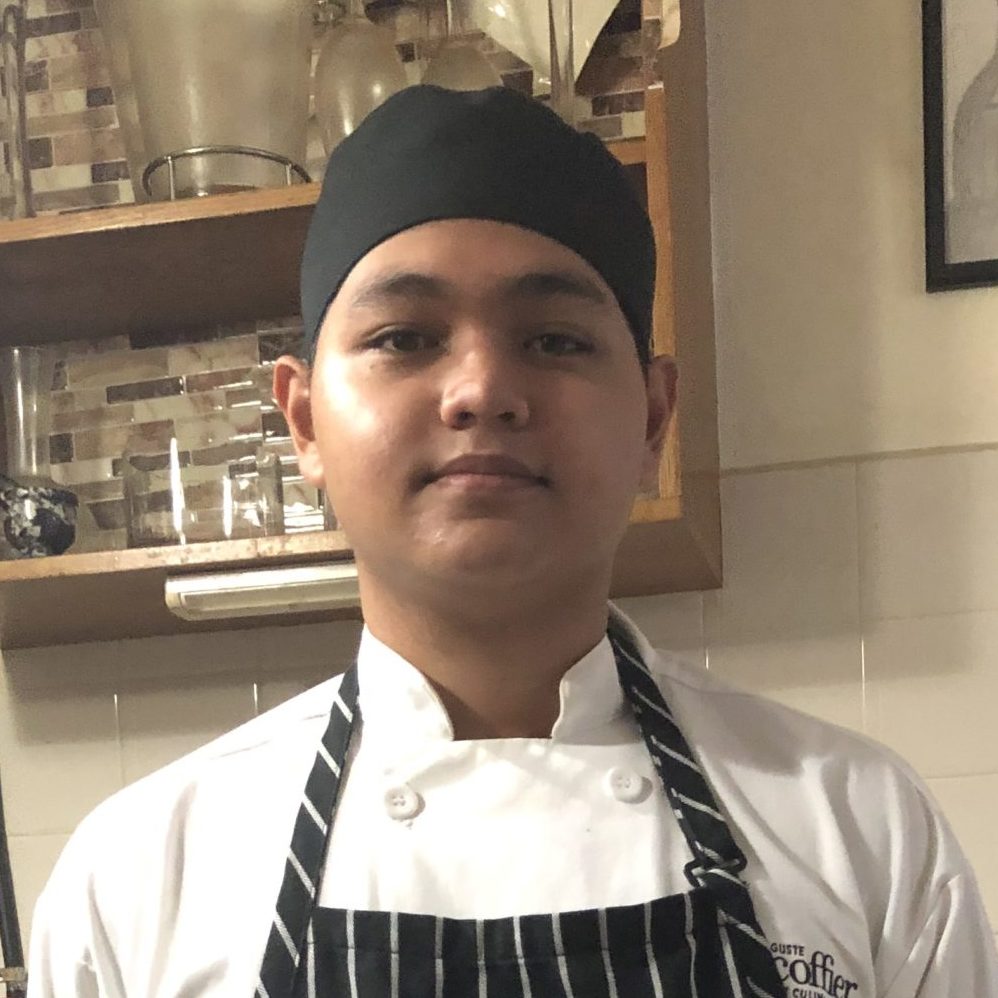
“There was one time when I made veloute, one of the mother sauces. I thought it tasted fine, but when I smelled it, it came off a little bit smoky, so I wrote it down. My Chef Instructor gave me feedback by looking at the pictures of my sauce. He noticed the moments it began burning from the pictures that I didn’t really notice. But he was able to catch it, see where I went wrong, and correct me along the way.”*
DAMIAN PALACIOS, ONLINE CULINARY ARTS STUDENT
1Our Boulder, CO campus is the only accredited institution in the United States to offer both fully online diploma and degree programs with culinary classes and hands-on industry externships. We are accredited by ACCET – A Partnership for Quality®️. ACCET is listed by the U.S. Department of Education as a nationally recognized accrediting agency.
*This information may not reflect every student’s experience. Results and outcomes may be based on several factors such as geographical region or previous experience.
For more information about our completion rates and other important consumer information, please visit our website.
Read our privacy policy.
Copyright © 2025 Auguste Escoffier School of Culinary Arts. All rights reserved.
Auguste Escoffier School of Culinary Arts is a registered trademark of Triumph Higher Education Group. The Auguste Escoffier School of Culinary Arts Logo is a trademark of Triumph Higher Education Group.
